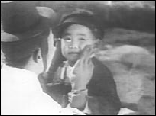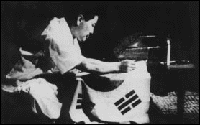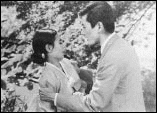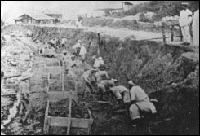|
|
|
|
|
| 日清・日露の両戦争を通じ、日本は朝鮮半島への支配力を強め、1910年には日本に植民地として併合された。日本では〈日韓併合〉と呼ばれる。朝鮮民族による抗日運動が展開されたが、日本は武力をもって弾圧した。朝鮮映画も徐々に日本映画に組み込まれ、自由な映画製作は封じ込められた。日本の敗戦による解放後は、民族の誇りを高らかに謳い上げる〈光復映画〉というジャンルが成立した。 | Through the Sino-Japanese and Russo-Japanese Wars, Japan strength-ened its power over the Korean Peninsula formally annexing it in 1910 it as a Japanese colony. This is referred to as the annexation of Korea. Although a resistance movement was formed by the Korean people, it was suppressed by Japanese military power. Korean cinema was soon integrated into the Japanese cinema and the freedom to produce films was taken away. Upon liberation at Japan's defeat a genre called " Liberation Films " was established that enthusiastically promoted national pride. |
|
|
|
京城(けいじょう)製作:大日本文化映画製作所 韓国の首都ソウルが、京城と呼ばれていた植民地時代の記録。撮影は小津安二郎作品で知られる厚田雄春。 |
Keijo (Kyong Seong / Seoul)Production : Dai-Nippon Cultural Film Studio A colonial era documentary from South Korean capital Seoul (known then in Japan as Keijo). |
|
|
|
||
 |
隣人愛監督:岡崎蓮司 植民地時代に日本が押し進めた融和政策を示す貴重な劇映画。日本人孤児を愛情を持って育てる朝鮮人夫婦の物語。 |
Love of Their NeighborsDirector : Okazaki Renji A film of invaluable interst which shows the " nification " program Japan put forward. A story of a Korean couple who lovingly bring up an orphaned Japanese child. |
|
|
||
 |
自由万歳製作:高麗映画協会 日本からの解放後の韓国で、地下独立運動を闘った愛国者たちを描いた劇映画。解放後の韓国抗日映画の第一ページ目を飾る作品。 |
Victory of FreedomProduction : Goryo Film Co. This film depicts the young Korean patriots who struggled for independence in the underground movement shortly after liberation from Japan. |
|
|
||
 |
李朝残影製作:申フィルム 日本の植民地時代の韓国を舞台とした日本の小説が原作の劇映画。日本人の青年画家と朝鮮人女性の悲恋を描いているが、その背景には〈三・一独立運動〉を虐殺をもって弾圧した過酷な日本支配の歴史がある。 |
Hidden Story of Yi DynastyProduction : Shin Film Based on a Japanese novel set in the Japanese colony of Korea, this film describes a romance between a young Japanese painter and a Korean woman, but the background is a history of Japanese domination and the cruel suppression of the March 1st Independence Movement Massacre. |
|
|
||
 |
受難の記録製作:総聯映画製作所 戦時中、労働力として日本に強制連行された体験を持つ在日朝鮮人たちにインタビューした記録映画。日本の繁栄の影に、多くの朝鮮人の犠牲があったことを丁寧に検証している。 |
Never Forget the PastProduction : Korean Film & Video Production in Japan A documentary with interviews of Koreans brought to Japan during the colonial era, and who still living here today.The Film examines the truth about Korean victims behind Japanese prosperity. |